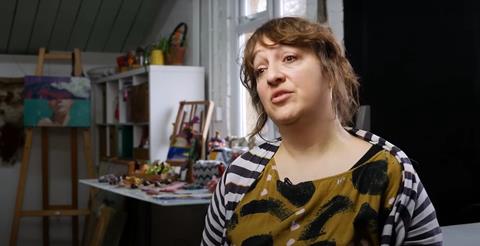Christian artist Victoria Culf explains how an honest conversation about gender led to accusations of transphobia and the loss of her work

As Christians, it is very hard to know what to do in these times. There’s a feeling of learned helplessness. We’ve been told for years to turn the other cheek and shake the dust, socially conditioned to roll over, accept that the end times are near and wait for Jesus to turn up, because the problems of this world are just too big.
I’m no theologian, but if the Old Testament teaches us anything, rolling over and giving up never worked for the Israelites. Nor did accepting the practices of other religions. God was pretty clear about worshipping other Idols.
Around 300 BC, Magna Mater/Cybele and her cross-dressing high priests—the Galli—were gender-questioning in an age of misogyny, with effeminate male priests castrating themselves in an act of frenzied worship, funded by the Roman state.
Millennia later, in 2025, state funds are directed to platform and affirm gender questioning and non-binary identities as ‘inclusive practice’—indoctrinating wider society as allies to the cause.
To say there is nothing new under the sun is an understatement (Ecclesiastes 1:9).
A creative calling
After taking time away from art to raise my children and then being forced to pause again by Covid, I began rebuilding my art practice with God at the centre.
I was invited to collaborate on a project focused on inclusion at a college serving young students with special education needs and disabilities — a partnership between BEEE Creative, Watford Borough Council and Watford Museum.
Alongside this, I had been planning my own independent exhibition at the museum, guided by the Holy Spirit, who very specifically wanted me to make work exploring inheritance. I was concerned about societal and environmental influences on young minds and what that would mean for generations going forward so I invited a secular colleague who was exploring similar themes to collaborate.
Where inclusion ends
During setup, I went downstairs to get a cup of tea for my colleague and I.
I was alone when the museum manager arrived. It had been a long time since I last saw her, so I had politely asked after her daughter for small talk, but she corrected me saying her daughter was now a boy and gave their new name.
Maybe I looked shocked; I didn’t say much but after a long ramble from her about how everyone was asking her how she was, I said, “Well it’s your family.”
I knew what happened to Kiera Bell and Chloe Cole. I knew the Tavistock Clinic and others were under investigation by Doctor Hilary Cass. I knew that there were 10 whistleblowers speaking up within Tavistock and anyone questioning gender affirming care was shot down in flames. I knew really vulnerable children and their families were being led down a path that would literally change their lives forever.
I also know what Jesus says in Luke 17:2 - ”It would be better for them to be thrown into the sea with a millstone tied around their neck than to cause one of these little ones to stumble.”
Hardest of all to bear was the lack of support from my church. It felt like everyone was angry with me, I realised how cowardly people really were
I trained for four years as an art therapist and worked in schools with really vulnerable children. I’ve also been a youth support worker, care worker, mentor for young people at risk of offending — I have a strong grounding in safeguarding.
So, when my colleague disclosed her child was waiting on a referral to Gender Identity Development Service (GIDS) at the Tavistock Clinic — “you know, puberty blockers,” — I offered her information on the latest neuroscience surrounding brain development, and the risks that children can’t yet assess. I also shared my belief that Tavistock should be shut down.
Though it felt uncomfortable afterwards, I offered her a cup of tea and tried to move on. I thought we agreed to disagree. I went back upstairs, spoke with my colleague and husband (giving them their teas), and carried on setting up.
The price I’m paying
The next day, I arrived to deliver the work, but the same manager refused to let me in. Eventually, she agreed to accept my final piece and asked her assistant to hang it for me.
The next morning, I had a work cancellation from BEEE Creative.
Then I got a phone call from another council employee telling me I was being investigated for harassment for comments I made about a staff member’s daughter and to get a statement ready, as the police were now investigating me. I was blindsided.
My dad is a retired policeman, so I’ve learned a few things. My conversation never constituted harassment. I dropped to my knees in prayer and God brought Christian Concern to mind. I called and spoke to a man named Navaid, who talked me through what to do if the police showed up. I waited anxiously all day, worried they might turn up at my children’s school when I was collecting my kids.
Later, the council employee phoned back around 4pm, informing me, “We’ll let you keep your exhibition up,” but I was to give 24 hours’ notice before arriving at the museum to safeguard their member of staff. And I was banned from the museum until further notice.
I asked about my private view and museum residency. She said she didn’t know and would get back to me. I asked if anyone wanted my side of the story. It was strange they only got one viewpoint. I was told the police were handling it now.
Then I received messages from the BEEE Creative CEO accusing me of being transphobic and warning that if I jeopardised the project, I’d be sacked. She angrily highlighted the inclusion policy. I thought it was a joke since it highlighted the right to freedom of religion and belief, but obviously only if your belief fit the narrative they were pushing.
BEEE Creative eventually terminated my contract — the council refused to work with me or allow me in the museum, and pressured BEEE to end their contract with me. I lost the remaining work, the related pay and then any possibility of a working relationship with them in the future.
Meanwhile, my work was damaged at the museum, and I had to give 24 hours’ notice just to go in and repair it. I only found out about the damage because a friend visited and showed me pictures. It was the piece I’d handed over in person.
Another colleague frantically asked what I’d done, assuming I was guilty after seeing social media posts from the manager playing victim to a transphobic and homophobic rant.
Rebuilding
The police never showed up. I was never told when the ban ended or the investigation closed. Other professionals in the arts ecosystem didn’t answer my emails.
I couldn’t access the exhibition space for a later show or to attend networking events. Job applications failed. It hit me hard.
I missed the budding friendship with my dance collaborator but hardest of all to bear was the lack of support from my church. It felt like everyone was angry with me for saying something, and I realised how cowardly people really were. I was literally left hanging.
A glimmer of light was a couple of charities I had long-standing relationships who knew me well enough to believe I was telling the truth and offered me some paid work.
I started having therapy again — I needed real, emotional support and wasn’t getting any from my church or leader.
When I finally snapped out of a static depression and mobilised, I moved to a new church that hadn’t embedded itself with the woke agenda. I got more political. I started training from the ground up as a counsellor and I am going back with a conversion course to upgrade my level 7 postgraduate diploma to a master’s degree in art therapy this September.
I don’t feel that the level of treatment I’ve received remotely reflects the actual conversation we had, and that really bothers me. It’s discrimination. That’s why Christian Concern are supporting me as I take legal action against Watford Borough Council on the grounds of breach of contract, discrimination and harassment.



































No comments yet